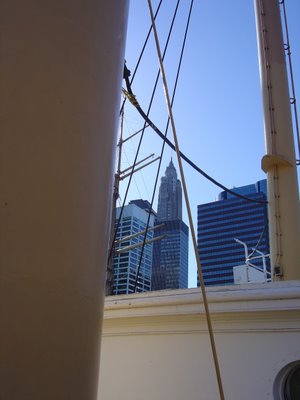Iran’s nuclear programme: what’s going on?Okay, so we’ve all heard the phrases: Iran has resumed uranium enrichment, it’s torn UN seals off research installations, the International Atomic Energy Agency (IAEA) might refer it to the Security Council.
Indeed, Iran’s chief hope of stalling UN action appeared to be negotiating with the E3 (France, the UK, Germany) and Russia. Now
France’s foreign minister has said that as no civilian program could explain the Iranian nuclear program the situation is simple: it’s a clandestine military program.
What the hell is going on? Here’s my effort at an idiot’s guide. (My apologies that this has become a very long post).
(1) Isn’t Iran obliged not to pursue nuclear research under the Non-Proliferation Treaty?No. Iran is a party to the NPT, but it only prohibits the non-nuclear weapons States (everyone but the US, UK, France, Russia and China) from having nuclear weapons.
There is nothing wrong with a civilian nuclear power program, indeed Article 4 of the NPT preserves the right “to develop research, production and use of nuclear power for peaceful purposes.”
The other problem with the NPT is there’s really not anything much wrong with enriching uranium to weapons grade. There’s also no prohibition on a parallel weapon program that could be used to deliver a conventional explosive or nuclear bomb by missile. A State could do both legally, pull out of the NPT on three months notice, and then put them together.
It’s this
lack of a safety margin that explains why everyone is so concerned about IAEA inspections, it’s the only guarantee of good faith that States are not moving to a weapons program (see below). It’s also a requirement under Article 3 of the NPT that all States sign up to an inspection program.
(2) What does it mean to “resume uranium enrichment”?There’s a
great diagram over at Le Monde. It’s pretty comprehensible even if you don’t read French.
The basics are these. Like most things dug out of the ground, unrefined uranium is not very useful. Refinement turns it into “yellowcake” powder, which is 75% uranium. Heated in the right conditions the yellowcake becomes uranium hexaflouride gas (or UF6). The UF6 can be refined into the seriously useful type of uranium (U-235) by spinning it in a centrifuge. As
the Guardian puts it:
“Uranium is enriched by spinning it at supersonic speeds in centrifuges. Hundreds of the machines are needed to obtain enough material for a bomb.
Diplomats said in September that Iran could have serious technical difficulties in enriching uranium on an industrial scale, which requires getting the centrifuges to work in cascades.”
If you’ve got enough cascades of centrifuges to refine it, or “enrich it”, improving the concentration of U-235 to 3-5% you can run a power plant; refine it to a concentration of 90% you have weapons-grade material. The other possible problem is that a civilian nuclear power program may itself produce material useful in weapons.
(Scientists, correct me if I’m wrong, please.)
So, Iran is “resuming” this process because in 2002-3 it had its first go at it. When they were caught out by US spy satellites and agreed to let the IAEA in, the IAEA found uranium enriched to a level well beyond what was needed for a civilian program. In 2004 the IAEA accused Iran of being less than fully frank with it, and Iran agreed to a voluntary suspension of enrichment activity. This is where the talk of “UN seals” comes in: Iran let the IAEA secure the facilities.
There’s a useful
timeline, again at Le Monde.
(3) What’s the fuss about IAEA inspections?Put simply, the NPT requires parties to enter inspection arrangements with the IAEA but does not provide a lot of detail. In practice the IAEA has negotiated “safeguards” agreements, also called Additional Protocols, allowing strengthened inspection measures (such as visiting on short notice) with most parties to the NPT (there’s a table of them
here).
The point of such inspections is to give the world confidence that nuclear material is not being diverted for military purposes. However, States commonly have concerns that IAEA inspections might allow commercially sensitive information to leak to other countries (essentially, a fear some inspectors might engage in industrial espionage). The tension between inspectors, hopefully acting for the global good, and State’s legitimate fears about sensitive information is reflected in Article 7 of the IAEA’s own
Model Protocol on inspections, providing that the State and the IAEA:
“shall make arrangements for managed access under this Protocol in order to prevent the dissemination of proliferation sensitive information, to meet safety or physical protection requirements, or to protect proprietary or commercially sensitive information. Such arrangements shall not preclude the Agency from conducting activities necessary to provide credible assurance of the absence of undeclared
nuclear material and activities at the location in question …”
Inspections in Iran have been carried out in accordance with such a Protocol.
The catch is Iran isn’t strictly bound by an Additional Protocol. One was negotiated between Iran and the IAEA in late 2003. It was signed, but it never entered into force.
It is quite common in international law for agreements not to be binding upon signature but only upon later “ratification”. This usually means taking the treaty back home and complying with any national law requirements before depositing an instrument of ratification, at which point the treaty may enter into force for the ratifying State.
Iran, however, has never taken the step of bringing it into force but rather has
pledged to apply its Additional Protocol pending entry into force. So they can thus call their co-operation with the IAEA voluntary, and claim a right to stop it at any moment. It’s really a very clever legal strategy.
(4) So where to now?The UN Security Council does not have to wait for the IAEA, legally speaking, before it declares that a State is pursuing a nuclear program that constitutes a threat to international peace and security. Once it has found such a threat, it can impose sanctions that UN members are obliged to implement.
The SC’s powers to protect international peace and security are sweeping. Even if Iran is doing nothing illegal under the NPT per se, or even if it withdraws from the NPT and is no longer legally bound by it – that’s irrelevant if the SC considers that it poses a threat to peace and security. So Iran's argument that it's not presently in legal or technical breach of NPT commitments may be - in a very narrow sense - correct; but that's hardly the point, especially given its history of trying to conceal part of its program from the IAEA.
What the IAEA process provides is a mechanism for diplomacy and a forum for Iran to build confidence that its nuclear program is intended only for civilian purposes. So why is it playing at diplomatic brinkmanship?
My guess is not that they necessarily want nuclear weapons, they want to pose a credible threat that they have the capacity to build nuclear weapons. When you’re sitting in a highly unstable region, and the US is busy redecorating in your next-door neighbours and has branded you part of an “axis of evil” – it’s not perhaps entirely unreasonable to want to possess your own nuclear deterrent.
It’s just a really high-risk strategy if what you’re after is security.
Update on Iran (20/02/06)According to Reuters Iran now appears to have poured cold water on Russia's offer to enrich Iranian uranium within Russian territory (thus preventing Tehran from diverting it for weapons, but allowing a peaceful power program). While they may accept it, they will not abandon research into further enrichment.























